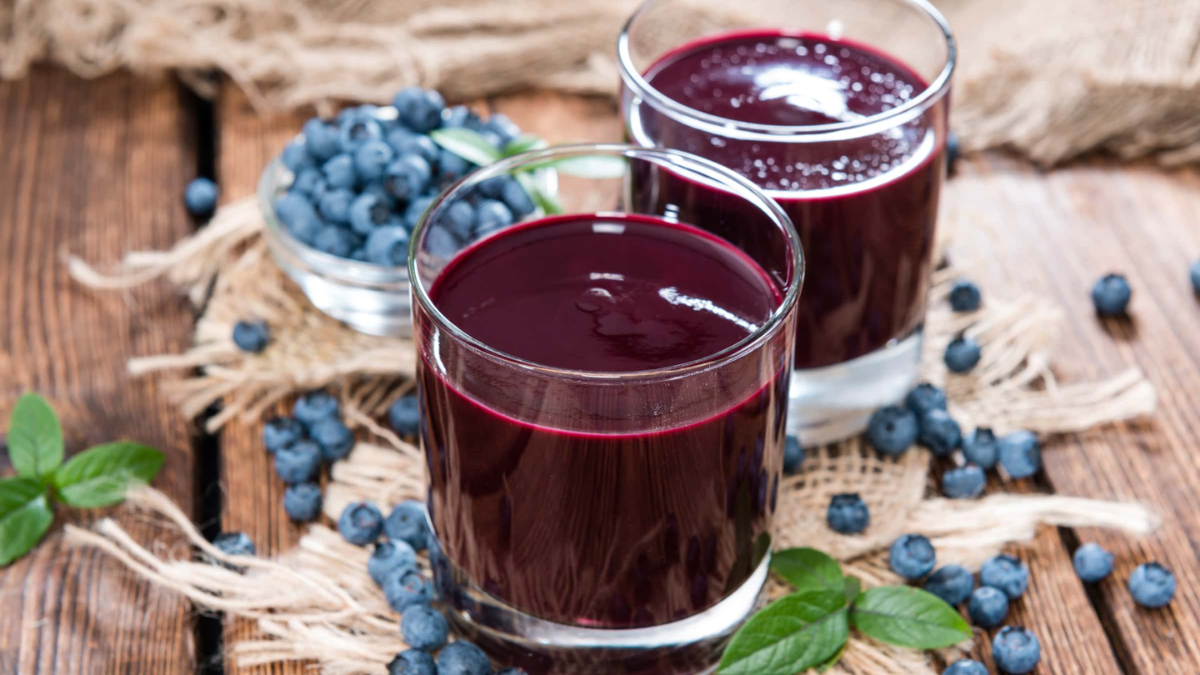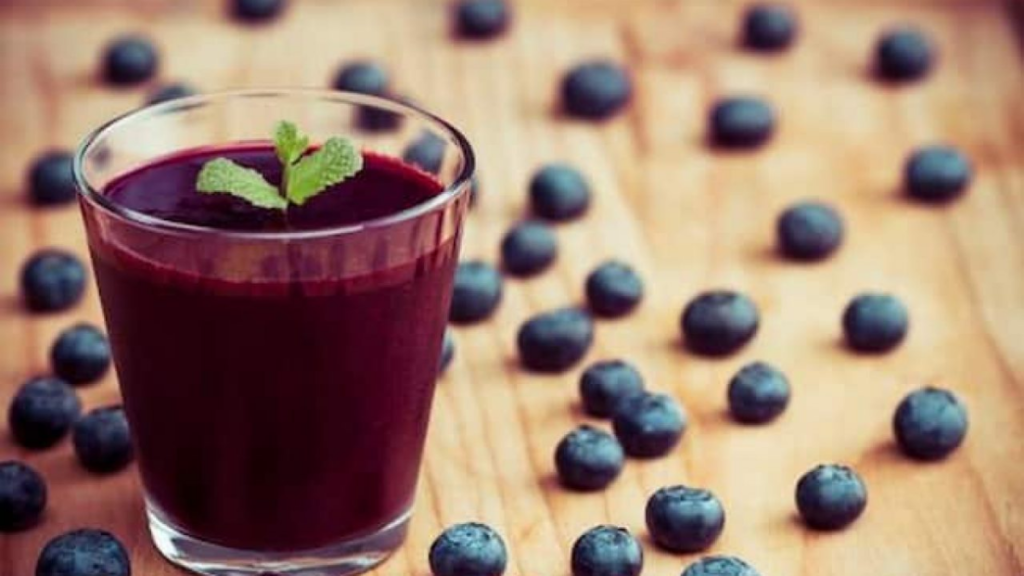Blueberry juice recipe with step-by-step directions. If you have berries on hand, you may produce an excellent juice quickly by juicing them. It’s no surprise that blueberry juice has antioxidant properties because blueberries are substantial in antioxidants. A glass of juice is also high in nutrients, including vitamins and minerals. To produce blueberry juice, mix the berries with a bit of water. A touch of lemon juice gives the juice a wonderful tang. Sweeteners can be left out or added according to personal liking.
Making blueberry juice is straightforward. The blueberry is a delicious fruit with a long list of health advantages. Blueberry juice can be made into jams and jellies, but it’s also a delicious drink. This delectable beverage can be the ideal companion in the sweltering summer months! If the blueberry season has passed you by, don’t panic; you can still create this delicious juice with blueberries from a can. If you plan on drinking the drink later, keep it refrigerated or in an insulated water bottle to maintain its freshness and temperature.
How to Make Blueberry Juice?
Ingredients
- 1 cup blueberries, fresh
- One tablespoon of lemon juice
- 1 cup water
- Optional: 1 to 2 teaspoons unrefined cane sugar
Instructions
- One cup of blueberries, rinsed many times in water. Soak the blueberries in water with one tablespoon of vinegar to get rid of pesticides. White vinegar or apple cider vinegar can be used. Allow 15 to 20 minutes for soaking.
- After the second washing in water, place the blueberries in a blender jar. Make sure to use a high-quality blender or mixer.
- 1 to 2 teaspoons of cane sugar; unrefined Sugar is optional and can be left out. You can also use any other sweetener you like, such as jaggery, palm jaggery, or coconut sugar.
- One cup of water You can use either cold or room temperature water.
- 1 tbsp. fresh lemon juice
- Blend until completely smooth.
- Pour blueberry juice into glasses and serve right away.
Is it Healthy to Consume Blueberry Juice?
Blueberry juice is high in antioxidants, which are chemicals that prevent free radicals from damaging body cells and contribute to the development of various health problems such as heart disease and cancer. Blueberry juice is high in antioxidants and contains vitamins C and K. It has a low fat and protein content but is abundant in manganese and other macronutrients and naturally occurring carbohydrates.
Blueberries, which are high in antioxidants, can help to neutralize some of the free radicals that cause DNA damage. In one study, 168 participants consumed 34 ounces (1 liter) of blueberry-apple juice regularly, and free radical-induced oxidative DNA damage was reduced by 20% after four weeks.
How Much Blueberry Juice Should I Consume Daily?
For customer safety, the juice is pasteurized. 75ml of pure blueberry juice is recommended as a daily serving. One-half cup of wild blueberries provides the same amount of antioxidants as that amount. Yes, you can overeat fruit, especially if you’re addicted to your juicer or blender. On the other hand, whole, fresh fruit is generally a healthy addition to any diet, as long as it is consumed in moderation. Before identifying a safe range, more research is required.
Follow the supplement label’s directions, which call for one tablespoon of dried powder, one tablet (containing 200 to 400 mg of blueberry concentrate), or 8 to 10 tablespoons of blueberry concentrate liquid each day. Blueberry juice has several health benefits, including the capacity to improve digestion, aid in weight loss, prevent Alzheimer’s and Parkinson’s disease, lower the risk of chronic diseases, protect the heart, and improve eye health.
Is Blueberry Juice Beneficial to the Kidneys?
The National Kidney Foundation ranks blueberries first in antioxidant potency, so add a glass of Mamaku Blue Blueberry Juice to your daily dose of kidney-friendly antioxidants and anthocyanins. These sweet berries, in particular, are high in antioxidants called anthocyanins, which may protect against heart disease, cancer, cognitive decline, and diabetes.
They’re also low in salt, phosphorus, and potassium, making them a great complement to a kidney-friendly diet. However, in the blueberry-fed OZR (OZRBB) rats, renal functional parameters were restored, revealing a significant rise in GFR and RBF and a decrease in RVR compared to their control diet-fed obese counterparts.
What is the Flavor of Blueberry Juice?
When you bite into a blueberry, you’ll get a burst of juice in your mouth, which is usually quite sweet but can also be sour. Unripe berries have an acidic flavor that might even be sour. Blueberries have a gently sweet, fruity flavor that makes them popular in cereals and pastries. Raw blueberries’ rich antioxidant capabilities and other health advantages make them ideal for breakfast, a go-to snack, or any other delightful blueberry combo. Blueberries are deep purple, which is the color of anthocyanin, a pigment found in abundance in blueberries.
For example, our forefathers would have recognized that berries with a deep color signified they were tasty and ripe. The sweeter red raspberries are, the riper they are. They have a slight tartness but not as much as a blackberry. This is an excellent berry to harvest from your garden. As they mature, they will produce new plants from the roots, increasing the size of your berry patch over time.
Is Blueberry Juice Beneficial to Those with High Blood Pressure?
According to a study published in the Journals of Gerontology, Series A: Biological Sciences and Medical Sciences, eating 200 grams (approximately one cup) of blueberries daily will improve blood vessel function and lower systolic blood pressure (the top number in a blood pressure reading)Blueberries, in particular, are high in flavonoids, which are natural chemicals. According to one study, consuming these substances may help prevent hypertension and decrease blood pressure.
Strawberries, blueberries, and raspberries are simple to incorporate into your diet. Berries such as lingonberry, bilberry, cranberry, and blackcurrant are high in the chemical and can assist in controlling high blood pressure. According to a recent experimental study, long-term ingestion of berry juice can assist people with hypertension lower their blood pressure.
Conclusion
Like many other fruit juices, blueberry juice is high in antioxidants, which reduce inflammation in the body. The elimination of toxic materials from the body helps maintain a healthy digestive and immunological system, protecting you from constipation, bloating, and other unpleasant symptoms. Aside from that, research shows that drinking blueberry juice can help prevent heart disease and stroke, and it also helps to keep cholesterol and blood pressure in check.
Blueberries are high in the critical dietary mineral manganese, vitamins B6, C, K, and dietary fiber. Blueberry juice, produced with ripe blueberries, celery, beetroot, and apple, allows you to enjoy all of the benefits of blueberries in a juice form. Learn how to prepare it in just a few minutes with this simple recipe, and don’t forget to check out the recommendations below for additional variations.

